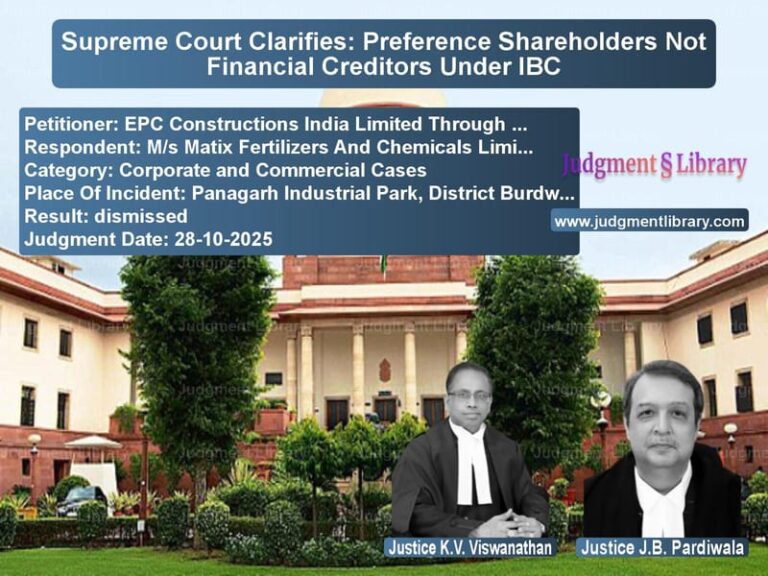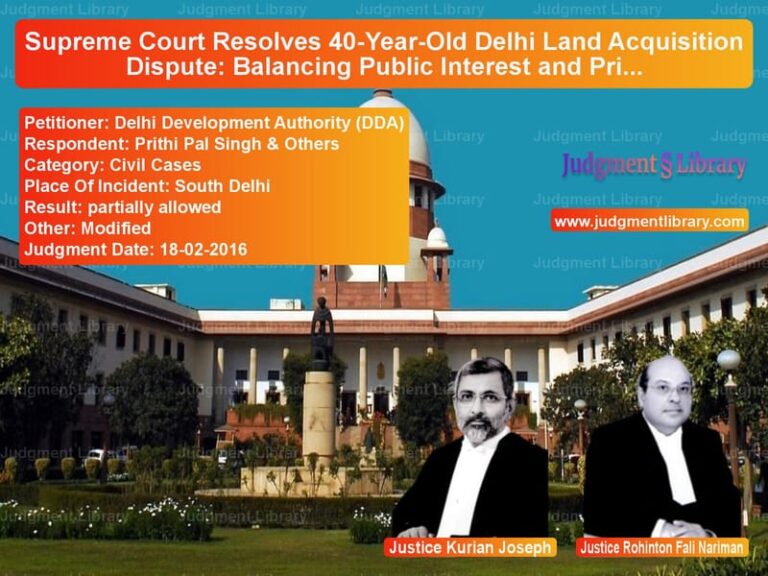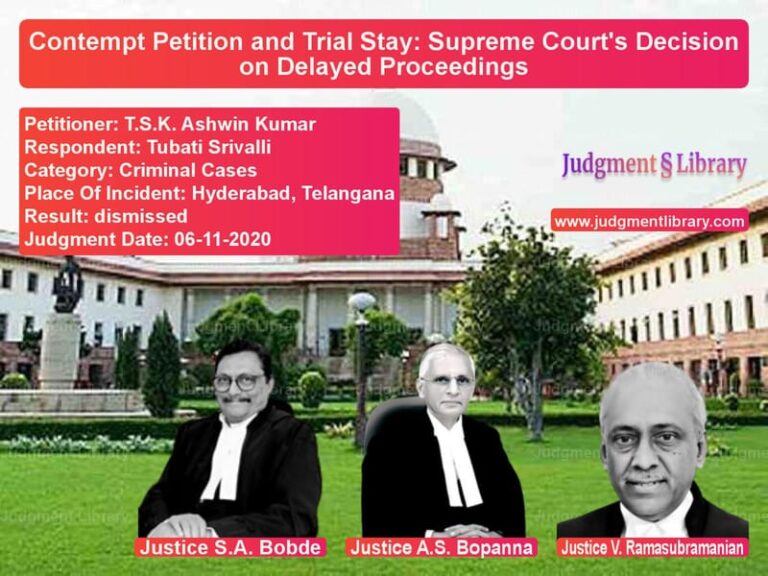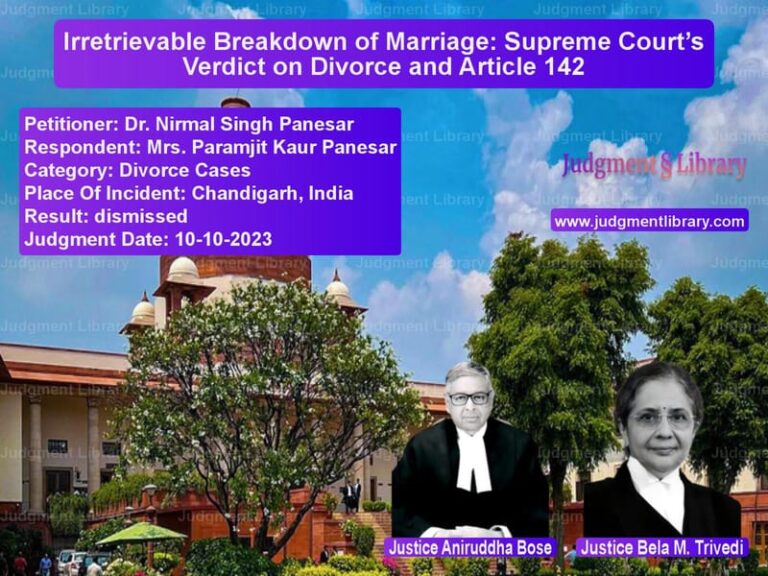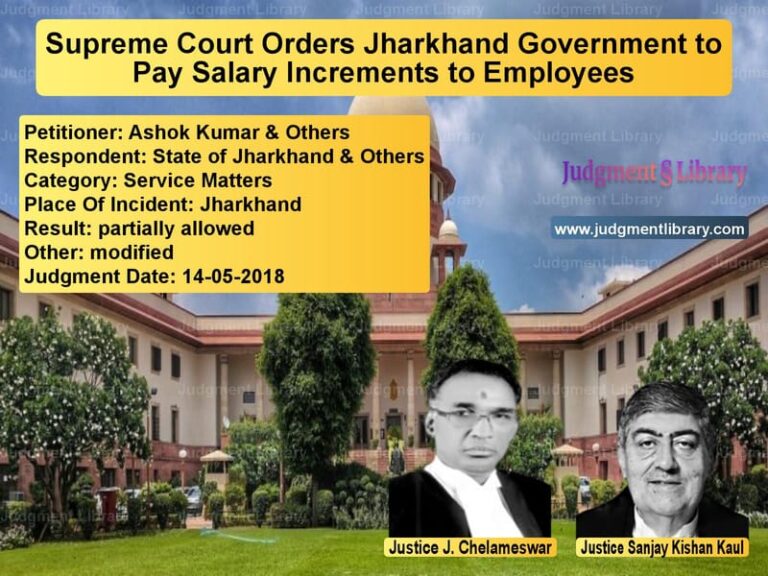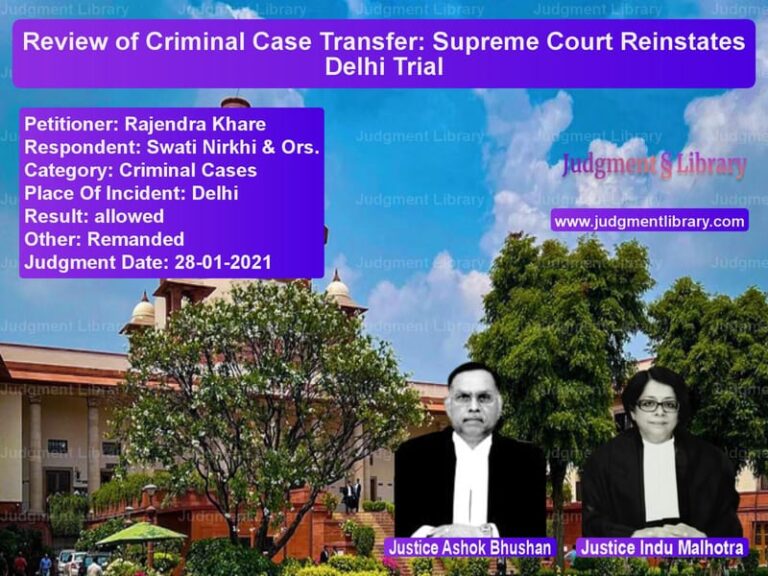Supreme Court Upholds Cancellation of Society Registration Over Fraud Allegations
The Supreme Court of India has delivered a significant judgment in the case of Chen Khoi Kui vs. Liang Miao Sheng & Ors., ruling that the Registrar of Societies has the authority to cancel a society’s registration if it was obtained through fraudulent means. The Court upheld the decision of the Calcutta High Court, which found that the registration of ‘Pei May Chinese High School’ was granted based on fabricated documents and was therefore liable for cancellation.
Background of the Case
The dispute arose between two factions of the Chinese Tannery Owners’ Association in Kolkata over control of the Pei May Chinese High School. The school, originally established in 1929 as ‘Pei May Chinese School’, was later moved to Tangra, a locality known for its Chinese community engaged in the leather industry. The Chinese Tannery Owners’ Association (CTOA) had been operating the school for several decades.
The controversy began when the Registrar of Societies granted registration to ‘Pei May Chinese High School’ as an independent society on 19 February 2010, allegedly based on an application containing forged signatures. The appellant, Chen Khoi Kui, representing the original association, argued that the school belonged to CTOA and that the newly registered society had no independent existence.
Legal Issues Considered
The key questions before the Court were:
- Does the Registrar of Societies have the power to cancel a society’s registration if it was obtained fraudulently?
- Were the documents submitted for registration of ‘Pei May Chinese High School’ fabricated?
- Did the Calcutta High Court correctly direct the Registrar to reconsider the cancellation?
Petitioner’s Arguments (Chen Khoi Kui)
The appellant argued:
- The original Chinese Tannery Owners’ Association had been managing the school since its inception, and the new society was fraudulently registered using forged documents.
- Several individuals listed as office bearers in the application for registration had denied any association with the newly formed society.
- The Registrar initially refused to cancel the registration despite overwhelming evidence of fraud, leading to litigation.
- The High Court rightly remanded the matter to the Registrar, who subsequently canceled the society’s registration on 19 April 2016.
Respondents’ Arguments (Liang Miao Sheng & Ors.)
The respondents countered:
- The Registrar had no express power under the West Bengal Societies Registration Act, 1961 to cancel a society’s registration.
- The High Court overstepped its jurisdiction by directing the Registrar to review his own order.
- The issue of alleged forgery was pending in civil and criminal courts, and any decision by the Registrar should have awaited their verdicts.
Supreme Court’s Observations
A bench comprising Justices Aniruddha Bose and Sudhanshu Dhulia examined the case and made the following key observations:
1. Registrar’s Power to Cancel Registration
The Court held that while the West Bengal Societies Registration Act, 1961 does not explicitly grant the Registrar power to cancel a registration, such a power is inherent under Section 22 of the Bengal General Clauses Act, 1899, which states:
Read also: https://judgmentlibrary.com/west-bengal-mining-lease-dispute-supreme-court-partially-allows-appeal/
“Where, by any Bengal Act or West Bengal Act, a power to issue orders, rules, bye-laws, or notifications is conferred, then, that power includes a power to amend, vary or rescind any orders, rules, bye-laws or notifications so issued.”
2. Fraud Vitiates Everything
The Court reiterated the well-established legal principle that fraud vitiates everything. It cited previous rulings in Grindlays Bank Ltd. vs. Central Government Industrial Tribunal and Kapra Mazdoor Ekta Union vs. Birla Cotton Spinning & Weaving Mills Ltd., which confirmed that an authority has the power to review its own decision if fraud is discovered.
3. Evidence of Forgery
The Supreme Court noted that multiple individuals listed as office bearers of the newly registered society had filed affidavits stating that their signatures were forged. Moreover, a criminal investigation had been initiated in FIR No. 673/2010 regarding the alleged forgery.
4. Role of Civil and Criminal Proceedings
The Court clarified that while the criminal case had been closed with the accused being discharged in April 2021, this did not preclude the Registrar from canceling the registration based on documentary evidence of fraud.
Final Verdict
The Supreme Court ruled:
- The Calcutta High Court’s decision to direct the Registrar to review the registration was valid.
- The Registrar’s order dated 19 April 2016 canceling the registration of ‘Pei May Chinese High School’ was upheld.
- The respondents’ claim that the cancellation was beyond the Registrar’s power was dismissed.
- The case was remanded to the civil court for any further adjudication regarding the property rights of the school.
Implications of the Judgment
This ruling has far-reaching consequences:
- Affirms Registrar’s Review Power: Societies registered through fraudulent means can have their registration canceled.
- Strengthens Anti-Fraud Measures: Authorities can intervene if forged documents are discovered post-registration.
- Protects Property Rights: The Court clarified that the ownership of the school’s land remains a separate legal issue to be decided by the civil court.
- Prevents Misuse of Society Registration Laws: Ensures that illegal takeovers of institutions cannot be legitimized through fraudulent registration.
Conclusion
The Supreme Court’s ruling in Chen Khoi Kui vs. Liang Miao Sheng & Ors. is a landmark decision reinforcing that fraudulently obtained society registrations can be canceled by the Registrar of Societies. By upholding the cancellation order, the Court has set a precedent ensuring that legal frameworks are not misused to take over institutions through fabricated documents.
This judgment serves as a strong warning against fraudulent practices in society registrations and underscores the importance of regulatory oversight in maintaining transparency and fairness in institutional governance.
Petitioner Name: Chen Khoi Kui.Respondent Name: Liang Miao Sheng & Ors..Judgment By: Justice Aniruddha Bose, Justice Sudhanshu Dhulia.Place Of Incident: Kolkata, West Bengal.Judgment Date: 13-09-2023.
Don’t miss out on the full details! Download the complete judgment in PDF format below and gain valuable insights instantly!
Download Judgment: chen-khoi-kui-vs-liang-miao-sheng-&-o-supreme-court-of-india-judgment-dated-13-09-2023.pdf
Directly Download Judgment: Directly download this Judgment
See all petitions in Contract Disputes
See all petitions in Property Disputes
See all petitions in Legal Malpractice
See all petitions in Judgment by Aniruddha Bose
See all petitions in Judgment by Sudhanshu Dhulia
See all petitions in dismissed
See all petitions in Remanded
See all petitions in supreme court of India judgments September 2023
See all petitions in 2023 judgments
See all posts in Civil Cases Category
See all allowed petitions in Civil Cases Category
See all Dismissed petitions in Civil Cases Category
See all partially allowed petitions in Civil Cases Category


